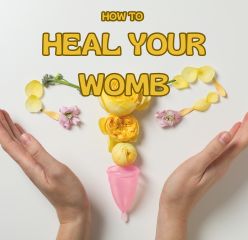I never anticipated searching for postpartum recovery tips when I was pregnant with my first child. That’s because I never gave the postpartum period much thought anyway. After much research, holistic postpartum care became my preferred way of healing from both births. More specifically, my holistic healing secret was herbal teas.
I did try other things as well though and I’m going to share them all in this article.
Are you searching for holistic postpartum care tips? In this article, I’m going to share with you the ones I tried that worked for me! We will also consider the postpartum period in general and how different people approach it.
To start with though, in case you’re in any doubt, let us establish how long the postpartum period is.
How long is a mother considered postpartum?

Officially, the postpartum period (sometimes referred to as the “fourth trimester”) is defined as being anytime between six to eight weeks after birth.
However, the exact duration can vary from woman to woman. Some sources may consider the postpartum period to extend up to a year after childbirth, covering the time it takes for a woman’s body to fully recover from pregnancy and childbirth, both physically and emotionally.
It’s important to remember that the postpartum period involves significant changes and adjustments for both mother and baby as they adapt to their new roles and routines.
Different mothers use various methods to get through and hopefully enjoy the postpartum period. These methods differ from culture to culture and sometimes will also differ because people have different levels of awareness of holistic postpartum care practices as well as varying degrees of access to medical support.
The 5 5 5 rule is one that some mothers use.
What is the 5 5 5 rule for postpartum?

The 5-5-5 rule for postpartum recovery is a guideline that provides a framework for assessing and monitoring a mother’s health and well-being during the postpartum period. The rule suggests the following:
- 5 Days: In the first five days after childbirth, a mother should focus on rest, recovery and bonding with her newborn. This period is crucial for allowing the body to heal from the physical stresses of labor and delivery, as well as adjusting to the demands of caring for a newborn.
2. 5 Weeks: During the first five weeks postpartum, a mother should continue to prioritize self-care, rest and recovery. This period is when many physical changes and challenges associated with childbirth, such as bleeding, soreness, and hormonal fluctuations, may occur. It’s important for mothers to listen to their bodies, seek support as needed and gradually ease back into daily activities.
3. 5 Months: By five months postpartum, a mother should be settling into a more established routine with her baby and experiencing fewer physical challenges. However, the postpartum period extends beyond the immediate weeks and months following childbirth and mothers may continue to experience emotional and physical changes as they navigate motherhood.
The 5-5-5 rule emphasizes the importance of prioritizing self-care, seeking support and allowing time for healing and adjustment during the postpartum period. It serves as a reminder for mothers to be patient and gentle with themselves as they transition into their new role and navigate the challenges of early motherhood.
Another rule that some women follow postpartum is the 40 day rule.
What is the 40 day rule after birth?

The 40-day rule after birth – also known as the “lying-in” period or confinement period – is a cultural practice observed in many traditions around the world. It emphasizes the importance of allowing mothers ample time for rest, recovery and bonding with their newborn during the initial six weeks following childbirth.
During this period, mothers are encouraged to focus on their postpartum recovery, practicing holistic postpartum care to support their physical, emotional and mental well-being. Postpartum recovery tips often include prioritizing rest, nourishing foods, and gentle movement to aid in healing and rejuvenation. Holistic postpartum care may involve practices such as herbal remedies, therapeutic massage and mindfulness techniques to promote overall wellness after childbirth.
Mind-body wellness after childbirth is a central focus during the 40-day rule, as mothers navigate the physical and emotional changes that accompany the postpartum period. This time allows mothers to gradually regain their strength, energy and sense of balance as they adjust to their new role as caregivers. It also provides an opportunity for mothers to bond with their newborns and establish breastfeeding routines, fostering a strong connection between mother and baby.
By honoring the 40-day rule after birth, mothers can give themselves the time and space they need to heal, recover and thrive during the postpartum period. It serves as a reminder of the importance of self-care, support and mindful attention to both physical and emotional well-being after childbirth.
The best holistic approaches to postpartum recovery

Holistic postpartum care emphasizes nurturing the mind, body and spirit to support the recovery process after childbirth. Here are some of the best holistic approaches to postpartum recovery, including the use of herbal teas:
- Herbal teas
As I mentioned above, I really do believe herbal teas were the key for me. There were some that I even made myself.
Herbal teas can be a soothing and nourishing addition to postpartum recovery. Teas like chamomile, ginger and raspberry leaf are known for their calming and healing properties. Chamomile tea can help promote relaxation and relieve stress, while ginger tea aids digestion and alleviates nausea. Raspberry leaf tea is rich in nutrients and can support uterine health and postpartum healing.
- Nutrient-rich foods
Focus on consuming nutrient-dense foods to support healing and replenish essential nutrients lost during childbirth. Incorporate plenty of fruits, vegetables, whole grains, lean proteins, and healthy fats into your diet. Consider including foods rich in iron, calcium, vitamin D and omega-3 fatty acids to promote energy levels, bone health and mood stability.
- Gentle exercise
Engage in gentle exercises like walking, yoga or postpartum-specific workouts to promote circulation, strengthen core muscles, and alleviate tension. Listen to your body and progress at a pace that feels comfortable for you. Avoid high-impact exercises or intense workouts during the early postpartum period and consult with a healthcare provider before starting any new exercise regimen.
- Rest and recovery
Prioritize adequate rest and sleep to support your body’s healing process. Nap when your baby naps, delegate household tasks, and ask for help from friends and family members. Practice relaxation techniques like deep breathing, meditation or mindfulness to reduce stress and promote relaxation.
- Emotional support
Seek emotional support from loved ones, support groups, or a mental health professional to address any feelings of anxiety, depression, or overwhelm. Holistic postpartum care recognizes the importance of nurturing mental and emotional well-being alongside physical recovery. Connect with other moms, share your experiences, and seek guidance from professionals who specialize in maternal mental health.
- Herbal remedies
In addition to herbal teas, consider incorporating other herbal remedies into your postpartum routine. Try herbal sitz baths, postpartum herbal supplements or herbal tinctures designed to support hormone balance, lactation or mood stabilization.
- Chiropractic care
Gentle chiropractic adjustments can help realign the spine, pelvis and joints after childbirth, easing discomfort and promoting optimal postpartum recovery. Chiropractic care may also support hormonal balance and overall wellness.
- Homeopathy
Homeopathic remedies can be used to address various postpartum symptoms, including soreness, fatigue, mood swings and breastfeeding issues. Consulting with a qualified homeopath can help identify individualized remedies to support holistic postpartum care.
- Journaling and reflection
Encouraging mothers to journal or engage in reflective practices can support emotional processing, self-discovery and personal growth during the postpartum period. Writing down thoughts, feelings and experiences can be cathartic and empowering. Refer to my blog post on how new moms can effectively use journaling.
I also have a Self-Discovery Bundle for New Moms. This printable self-discovery bundle includes:
70 Journal Prompts
Prompts that make it easy to document this special journey in your life so that you can look back on beautiful memories and lessons learned
7 Letters from Mom
Keep a brief diary of moments from this time to bond over and share with your child when they’re older
30 Empowering Flashcards for Moms
As a new mom, each day comes with its ups and downs. Spread these around the house for a daily source of self-motivation and encouragement!
The 14-Day Postpartum Self-Care Challenge
A two week reminder to do something loving and helpful for yourself everyday—no matter how small. Self-love is vital for being able to show others love!
Let me know if you get it and how much you enjoy it!






